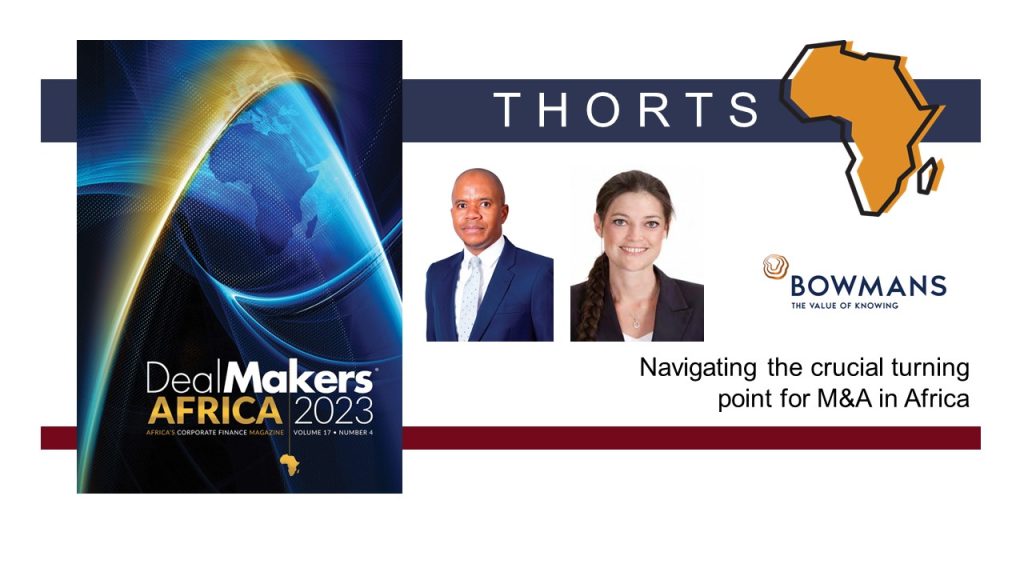From global economic headwinds to regional challenges, our world has experienced a plethora of disruptions of late, which have invariably reshaped the contours of deal-making and investment. As significant changes ripple across continents, there is one that has begun to emerge as a focal point of interest: Africa.
With at least half of all global impact investment capital being injected into Africa, countries like Egypt, Kenya, Nigeria and South Africa stand as beacons, drawing significant attention.
This investment flow has been most notably propelled by certain key sectors.
With escalating expenses in healthcare, key players are harnessing the power of digital health technologies – not only to curb soaring costs, but also to enhance their competitive edge and broaden the reach of medical services across the continent. Concurrently, there’s a palpable excitement among patients and healthcare consumers, who have swiftly embraced the numerous digital health solutions that emerged in the wake of the COVID-19 pandemic. This has resulted in pharmaceuticals, biotechnology, and medical services standing out as frontrunners for M&A activity in the sector, particularly within the private equity segment.
African fintech is also pulling in substantial investments, drawn by commitments to financial inclusivity and the promise of healthy returns among the continent’s youthful population. However, regulators have flagged concerns over consumer protection, data privacy and protection, and the competition implications of the digital economy – issues that must be addressed if the sector is going to continue to be attractive to international investors.
The pressing need to rectify long-standing energy shortages throughout Africa, coupled with the shift in global priorities, has also amplified the focus on the renewable energy sector, making it a pivotal driver for M&A activity in the region. As several African nations grapple with intermittent power supplies and an over-reliance on fossil fuels, there is a growing recognition of the potential that renewable sources such as solar, wind and hydro present.
As a result, M&A activity has surged, with conglomerates and startups alike seeking partnerships and acquisitions that can expedite the transition to cleaner energy solutions – presenting a dual opportunity for investment and impact.
Africa’s telecommunication sector has also emerged as one of the fastest-growing industries on the continent, and is poised to drive considerable economic growth in the future.
Another sector that has seen a resurgence is mining and minerals, as the need for essential minerals like copper, nickel, lithium and cobalt is on the rise globally, although commodity price deterioration and uncertainty are having a significant impact.
While these sectors highlight current M&A opportunities in Africa, other recent developments provide hope amid the challenging global economic conditions. For example, the African Continental Free Trade Area (AfCFTA) is gaining unprecedented momentum. Having garnered commitment from 54 nations and been ratified by 46, AfCFTA is poised to emerge as the world’s most expansive free trade zone.
Its comprehensive protocols, ranging from goods and services trade to intellectual property and investment frameworks, are either already operational or progressing auspiciously. The anticipated dividends include a boost in intra-African commerce, the fostering of regional value networks, empowerment of African enterprises, and a reinvigorated stance on economic diplomacy.
Recent moves by BRICS to invite Ethiopia and Egypt (among others) to join South Africa, Brazil, Russia, India and China, collectively, to other trade agreements may pave the way for a more influential African voice in global politics, institutions and financial systems.
As the African investment landscape evolves, the emphasis on environmental, social and governance (ESG) considerations will intensify. The global pivot towards sustainable practices is undeniable, and businesses now face scrutiny not only for their contributions to sustainability but also the authenticity of their commitments, with accusations of ‘greenwashing’ under rigorous review.
Furthermore, the investor lens is adapting, particularly from an international stakeholder’s perspective. They are progressively gauging the long-term environmental and societal impacts of ventures they fund. It is evident that ESG considerations will be instrumental in steering future M&A strategies, influencing the choice of acquisition targets, valuation methods and risk assessments. Both buyers and sellers will find it imperative to showcase their ESG prowess, with these credentials increasingly serving as a barometer for an organisation’s ethos and growth potential.
Notably, regulatory, public interest and local ownership considerations, as well as shareholder activism, are playing an increasing role in M&A. This has added additional burdens that parties ought to consider, although these are not usually insurmountable.
Africa stands on the precipice of significant change, characterised by a confluence of dynamic factors that signal both formidable challenges and unparalleled opportunities. The shifts in the M&A terrain are not merely transactional, but transformative, marking a pivotal moment in the continent’s economic trajectory.
Those equipped with the foresight to discern and adeptly engage with these changes will not only witness, but actively shape the next exciting chapter in Africa’s economic odyssey.
Tholinhlanhla Gcabashe is Co-Head of M&A and Cathy Truter is Head of Knowledge | Bowmans

This article first appeared in DealMakers AFRICA, the continent’s quarterly M&A publication.
DealMakers AFRICA is a quarterly M&A publication
www.dealmakersafrica.com



